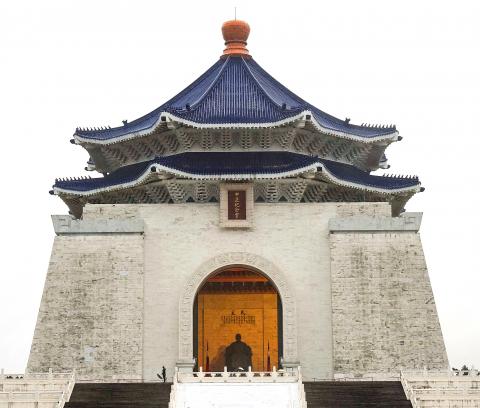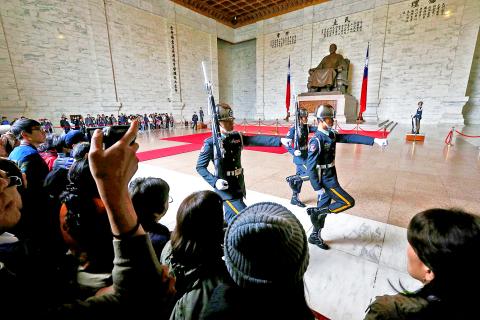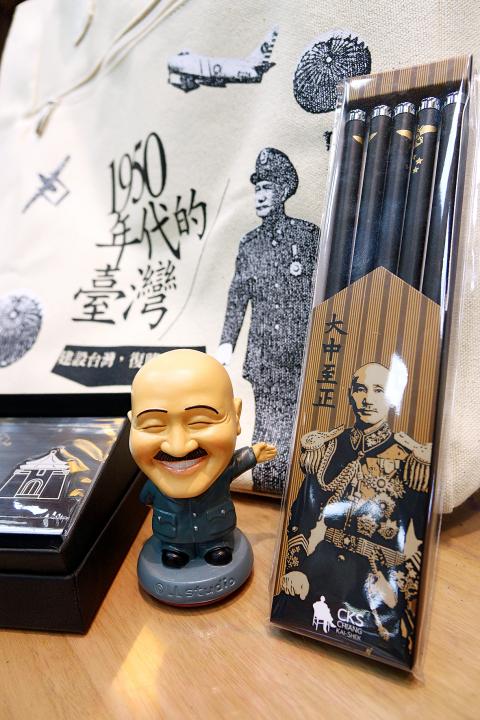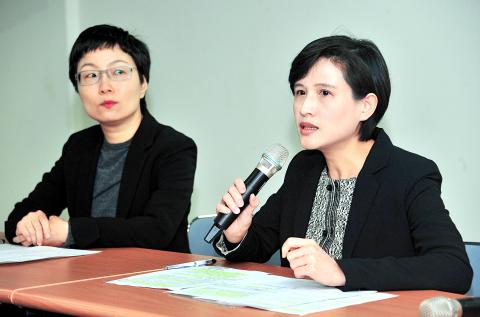The Ministry of Culture yesterday said it is working on a bill to reinvent the Chiang Kai-shek (蔣介石) Memorial Hall, which, if passed, would see the Taipei landmark renamed and most, if not all, of the authoritarian symbols associated with Chiang removed.
“We all know that the Chiang Kai-shek Memorial Hall was built during the nation’s authoritarian era to commemorate a dictator,” Minister of Culture Cheng Li-chiun (鄭麗君) told a Taipei news conference to outline the ministry’s work to promote transitional justice.
“This year marks the 70th anniversary of the 228 Incident and the 30th anniversary of the lifting of martial law. In order to come to terms with history and the damage done, and to pay respect to human rights, we believe that it is necessary to reinvent the Chiang Kai-shek Memorial Hall,” she said.

Photo: Huang Yao-cheng, Taipei Times
The ministry is working on a draft amendment to the Organization Act of National Chiang Kai-shek Memorial Management Office (國立中正紀念堂管理處組織法), which is to be reviewed by the Cabinet and the legislature, she said, adding that the ministry hopes the draft can be passed into law within the next six months, during the upcoming legislative session.
The ministry this month pulled merchandise bearing Chiang’s portraits — including figurines, stationery and accessories — from souvenir stores in the building, Cheng said.
The merchandise can still be bought elsewhere, but it would no longer be manufactured, Cheng said.

Photo: CNA
The ministry has restored the names of exhibition halls and performance venues that were later named after Chiang and his relatives, because the original titles were more generic and thus are not viewed as authoritarian symbols, she said.
For example, the Jie Shi Exhibition Hall, whose title adopted an alternative version of Chiang’s name, was seen yesterday to have regained its original title: “The Second Exhibition Hall.”
Broadcasts of the Chiang Kai-shek Memorial Song — played twice a day as the hall opens and closes — are to be replaced by announcements informing visitors of the facility’s opening hours, Cheng said.

Photo: Chen Yi-chuan, Taipei Times
The ministry this month assembled a panel of experts and academics to assess its plans to repurpose the edifice and gather public opinion on the issue, she said.
In response to media queries over whether the building would be renamed the Taiwan Democracy Memorial Hall, a name proposed by the Ministry of Education in 2007, Cheng said the title is being considered by the ministry, adding that the act must be amended before the building’s name can be officially changed.
She reiterated the necessity of amending the act when asked whether exhibits and artifacts associated with Chiang would be removed from the building, as the act stipulates that work to archive and maintain artifacts related to Chiang be performed by the National Chiang Kai-shek Memorial Hall Management Office.

Photo: Chen Yi-chuan, Taipei Times
Asked whether statues and busts of Chiang would be removed and the daily ceremony of military police changing shifts stopped, Cheng said the issues would be decided after consulting public opinion.
The ministry seeks to transform the building into a facility promoting art and culture, she said.
Northern Taiwan Society chairman Chang Yeh-shen (張葉森) yesterday lauded the ministry’s proposal as “belated justice,” adding that without taking the step of tackling the issues concerning the memorial hall, any talk of implementing transitional justice is worthless.
Additional reporting by Su Fang-ho and Abraham Gerber

Tropical Storm Gaemi strengthened into a typhoon at 2pm yesterday, and could make landfall in Yilan County tomorrow, the Central Weather Administration (CWA) said yesterday. The agency was scheduled to issue a sea warning at 11:30pm yesterday, and could issue a land warning later today. Gaemi was moving north-northwest at 4kph, carrying maximum sustained winds near its center of up to 118.8kph and gusts of 154.8kph. The circumference is forecast to reach eastern Taiwan tomorrow morning, with the center making landfall in Yilan County later that night before departing from the north coast, CWA weather forecaster Kuan Shin-ping (官欣平) said yesterday. Uncertainty remains and

SEA WARNING LIKELY: The storm, named Gaemi, could become a moderate typhoon on Wednesday or Thursday, with the Taipei City Government preparing for flooding A tropical depression east of the Philippines developed into a tropical storm named Gaemi at 2pm yesterday, and was moving toward eastern Taiwan, the Central Weather Administration (CWA) said. Gaemi could begin to affect Taiwan proper on Tuesday, lasting until Friday, and could develop into a moderate typhoon on Wednesday or Thursday, it said. A sea warning for Gaemi could be issued as early as Tuesday morning, it added. Gaemi, the third tropical storm in the Pacific Ocean this typhoon season, is projected to begin moving northwest today, and be closest to Taiwan on Wednesday or Thursday, the agency said. Today, there would likely

DISRUPTIONS: The high-speed rail is to operate as normal, while several airlines either canceled flights or announced early departures or late arrivals Schools and offices in 15 cities and counties are to be closed today due to Typhoon Gaemi, local governments announced last night. The 15 are: Taipei, New Taipei City, Taoyuan, Tainan, Keelung, Hsinchu and Kaohsiung, as well as Yilan, Hualien, Hsinchu, Miaoli, Chiayi, Pingtung, Penghu and Lienchiang counties. People should brace for torrential rainfall brought by the storm, with its center forecast to make landfall on the east coast between tonight and tomorrow morning, the Central Weather Administration (CWA) said. The agency issued a sea warning for the typhoon at 11:30pm on Monday, followed by a land warning at 11:30am yesterday. As of

CASUALTY: A 70-year-old woman was killed by a falling tree in Kaohsiung as the premier warned all government agencies to remain on high alert for the next 24 hours Schools and offices nationwide are to be closed for a second day today as Typhoon Gaemi crosses over the nation, bringing torrential rain and whipping winds. Gaemi was forecast to make landfall late last night. From Tuesday night, its outer band brought substantial rainfall and strong winds to the nation. As of 6:15pm last night, the typhoon’s center was 20km southeast of Hualien County, Central Weather Administration (CWA) data showed. It was moving at 19kph and had a radius of 250km. As of 3pm yesterday, one woman had died, while 58 people were injured, the Central Emergency Operation Center said. The 70-year-old